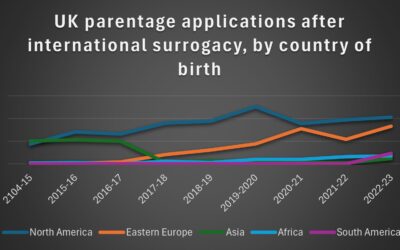Here is a brief guide to what you need to know if you are considering exporting your frozen gametes (sperm or eggs) or embryos from the UK to overseas.
Why might I decide to move my eggs, sperm or embryos from the UK to another country?
There are a variety of possible reasons. It is common for intended parents from the UK who need the help of a surrogate to look overseas given the difficulties finding a UK surrogate and the fact that surrogacy agreements are unenforceable in the UK, which unfortunately doesn’t look set to change any time soon. Others may have stored their gametes ahead of cancer treatment or gender reassignment, or as part of IVF treatment to conceive an older child, and are now looking pursue their route to parenthood abroad because they are living abroad or simply prefer to access treatment services available overseas.
How do I go about exporting my stored eggs, sperm or embryos?
- Consider any timescales you are working to as exporting can be a long and bureaucratic process.
- Talk to the UK clinic where your gametes or embryos are stored (or identify a licensed UK fertility clinic to work with). Tell them you want to export at an early stage, as there may be early screening tests they need to do (either before embryo creation or retrospectively) in order to export.
- Identify your treating clinic abroad and get their advice too. There may also be screening tests which need to be done at the receiving end, which may be different to those required by UK regulation. Choose a clinic which commonly imports gametes and embryos from the UK to ensure they are experienced with the process. Our sister organisation, Brilliant Beginnings, helps UK intended parents to identify suitable clinics in the US during international surrogacy journeys
- Your UK and overseas clinic will need to communicate with each other to make sure that each is complying with the relevant regulatory rules. This can include confirming accreditations and safety protocols as well as making arrangements for safe transport with an approved courier. Assembling all the necessary paperwork can take some time.
What are the UK legal/regulatory rules?
UK fertility clinics are licensed by the Human Fertilisation and Embryology Authority (the HFEA) and must comply with their Code of Practice and Directions. In order to export gametes or embryos, the HFEA requires clinics to either:
- meet the necessary criteria to export under the General Direction route (which is much simpler, allowing export to simply be arranged between the sending and receiving clinics, and so is always the preferred option), or
- apply for specific prior permission from the HFEA under the Special Direction route (which requires a longer and uncertain HFEA application based on your individual circumstances).
Broadly speaking, the General Direction route requires you to choose an overseas clinic which meets appropriate safety and accreditation standards, to give clear written consent and not to be exporting within the last six months of lawful UK storage or for any kind of treatment which would be illegal in the UK.
Are UK clinics allowed to export eggs, sperm or embryos for commercial surrogacy abroad?
Simply, yes. In 2020, we successfully challenged previous HFEA guidance that UK fertility clinics should not export embryos overseas for the purpose of ‘commercial’ surrogacy arrangements, and the HFEA has now issued new guidance making clear that UK clinics can export embryos or gametes for overseas surrogacy, even if surrogates or surrogacy agencies are being paid. UK clinics are no longer required to enquire about the planned payments before export.
What about the legal/regulatory rules in the country I am exporting to?
Foreign clinics may have particular requirements around screening and protocols for creating embryos in your country of export (such as FDA regulations in the US), so if you have already created embryos, you may need a waiver; otherwise, you will need to plan treatment carefully to do the necessary screening at the appropriate time. This will also factor into the requirements the UK clinics need to meet to satisfy HFEA criteria.
If my baby is conceived or born outside the UK, how does that affect my and my child’s legal rights?
It depends on how your child is born. If you are conceiving with your own eggs and sperm and carrying the pregnancy, UK law will treat you as the legal parents no matter where in the world you conceive.
If you are conceiving with the help of an egg or sperm donor, a lot will depend on the specifics (including your marital status and who is carrying the pregnancy), so it may be sensible to work through who the legal parents will be. Exporting can also affect the right your child will have to information about your donor, so make sure you understand how your choices will impact your family in the long term.
If you are conceiving through surrogacy, then you need to plan carefully, because UK law will not automatically recognise you as the legal parents even if you are recorded as the parents on the birth certificate issued in the country where your child is born. There are now established processes for bringing a child born through surrogacy overseas back to the UK, but this may take some time after the birth, and you will also need to make a UK court application to secure your parentage.
Understanding the system, and early planning, are key to using export of gametes or embryos as part of your family building journey.
The UK’s leading fertility lawyers
Find out more about how we support those creating families



